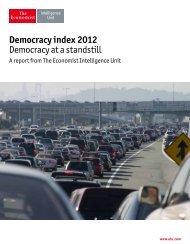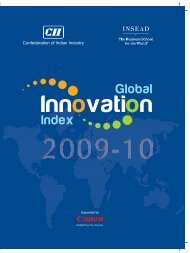1 PUBLIC POLICY FOR A KNOWLEDGE ECONOMY Joseph E ...
1 PUBLIC POLICY FOR A KNOWLEDGE ECONOMY Joseph E ...
1 PUBLIC POLICY FOR A KNOWLEDGE ECONOMY Joseph E ...
You also want an ePaper? Increase the reach of your titles
YUMPU automatically turns print PDFs into web optimized ePapers that Google loves.
Externalities<br />
Even if knowledge is not a pure public good, there are extensive<br />
externalities (spillovers) associated with innovations. The full benefits of the transistor or<br />
the laser clearly did not accrue to those who contributed to those innovations.<br />
My predecessor as Chairman of the Council of Economic Advisors, and Stanford<br />
colleague, Mike Boskin, was often quoted as saying that he did not care whether an<br />
economy produced potato chips or computer chips. This was his quip encapsulating his<br />
strong opposition to industrial policy. But he was wrong. There may be a difference<br />
between someone who makes a better potato chip and someone who makes a better<br />
computer chip: the magnitude of the externalities, the spillovers, may be an order of<br />
magnitude greater in the latter case than in the former. I shall return to this theme later in<br />
my discussion of industrial policy and picking winners.<br />
Competition<br />
The White Paper rightly emphasizes the importance of competition for the success<br />
of the knowledge economy. I find it remarkable how some of the debates over capitalism<br />
of former days are forgotten as the world confronts new challenges. In the 1930s, there<br />
was a great deal of worry about monopoly capitalism; the concern was that the new<br />
industrial technologies required sufficiently large scales of production for efficiency that<br />
there would be relatively few firms in any economy, leading to concentrations in economic<br />
(and therefore political) power. Adam Smith’s famous invisible hand theorem was<br />
predicated on the existence of competition. But was competition consistent with the<br />
newly emerging industrial economies<br />
Fortunately, it turned out that as the scale of markets expanded and technologies<br />
evolved, in most (but not all) industries there were many firms, perhaps not enough that<br />
the economy was well approximately by the perfect competition ideal that underlay<br />
Smith’s theorem, but sufficiently great that the worries about monopoly capitalism seemed<br />
ill-founded.<br />
But knowledge, almost by definition, gives rise to a form of increasing returns to<br />
scale which may undermine competition. These concerns are reinforced by the large<br />
10

















